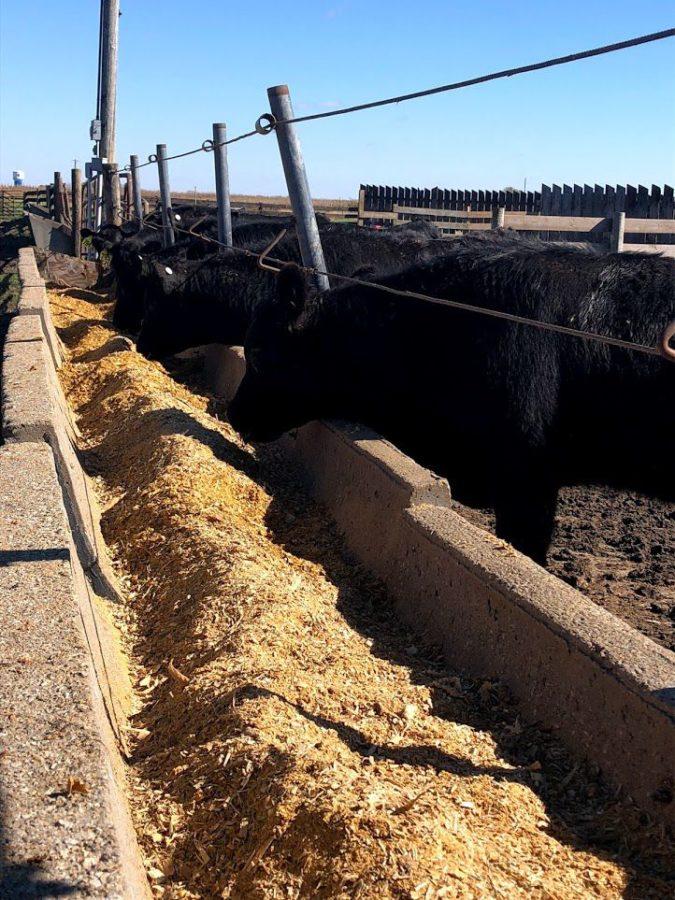Students research cattle health at beef nutrition farm
December 10, 2019
Iowa State has many farms dedicated to student research. One of these farms is the beef research farm.
Erin Deters, Aubree Beenken and Katie Heiderscheit are all graduate students in animal science. They work with cattle raised on the farm for their research regarding beef nutrition and behavior.
“We go to the beef nutrition farm, which is different from our beef teaching farm,” Heiderscheit said. “The beef teaching farm is more of a cow-calf operation, whereas the beef nutrition [farm] is a feedlot operation.”
To collect data from research the farm has to be set up differently than typical feedlots within the beef industry. Typically, farmers have cattle in pens of up to 100 cattle. At the beef research farm, pens are as few as six or seven animals.
“Something that is kind of unique about our farm compared to maybe some other universities is that we have a lot of small pens,” Deters said. “The small pens really allow us to take advantage of managing each animal individually by doing some really intensive sample collection, which isn’t really feasible with those large pens.”
Graduate students like Deters, Beenken and Heiderscheit, along with the farm managers, are in charge of making sure the livestock are happy and healthy.
“When we get our calves on the farm we are responsible for vaccinating them, keeping track of their health,” Beenken said. “We run them through the chute and weigh them about once a month and keep an eye on the calves.”
Weighing the cattle lets students know how well the animals are growing. In a feedlot, cattle growth and performance is very important because the focus is on their end product.
Sometimes factors can affect an animal’s growth. Factors like stress from transport are what Deters and Beenken study. They look for ways to decrease the negative effects the stress has on performance.
“My research has focused on when calves just get to the feedlot, how can we manage them to minimize the stress that they are experiencing and help them stay healthy and gain weight, and a lot of that has focused on transit stress,” Deters said.
Deters has implemented vitamin and mineral supplements into the diets of beef cattle and observed the effects they have on the animal’s ability to gain weight.
“We’ll basically design our treatments so we would have different rates of supplementation and then randomly assign cattle to those treatments,” Deters said. “Then see how feeding those different rates would improve or not change performance.”
Heiderscheit said since some of the research has to do with different additions to what cattle eat, their diet is formulated by students at the farm. Heiderscheit actually works on the farm where she feeds and takes care of the cattle.
Heiderscheit’s emphasis is on the behavior of cattle. She looks at how management and dietary practices impact an animal’s performance. In order to do so, cattle are observed with cameras in the feedlot.
“We record their behaviors and then we’ll create basically a sheet that says ‘These are the behaviors that we’re looking for,’” Heiderscheit said. “Behaviors like just laying down — and how long does it take them to lay down — or drinking or eating.”
It is research like this that graduate students can take with them into their careers.
“I’ve learned a lot about cattle digestion and metabolism, so I know a lot of the basic underlying physiology of why things should or shouldn’t work,” Deters said. “I personally would like to go into a research scientist position where I can help design some of these studies that help answer questions about what may or may not be beneficial to the beef industry.”
Similar to Deters, Beenken said she aspires to use what she has learned once she graduates and starts her career.
“Not only have I gotten to experience more of receiving cattle work, I get to see some of the nutrition and some of the health as well,” Beenken said. “My grad school program is helping me get more of a world view of things specific to the beef industry.”

















